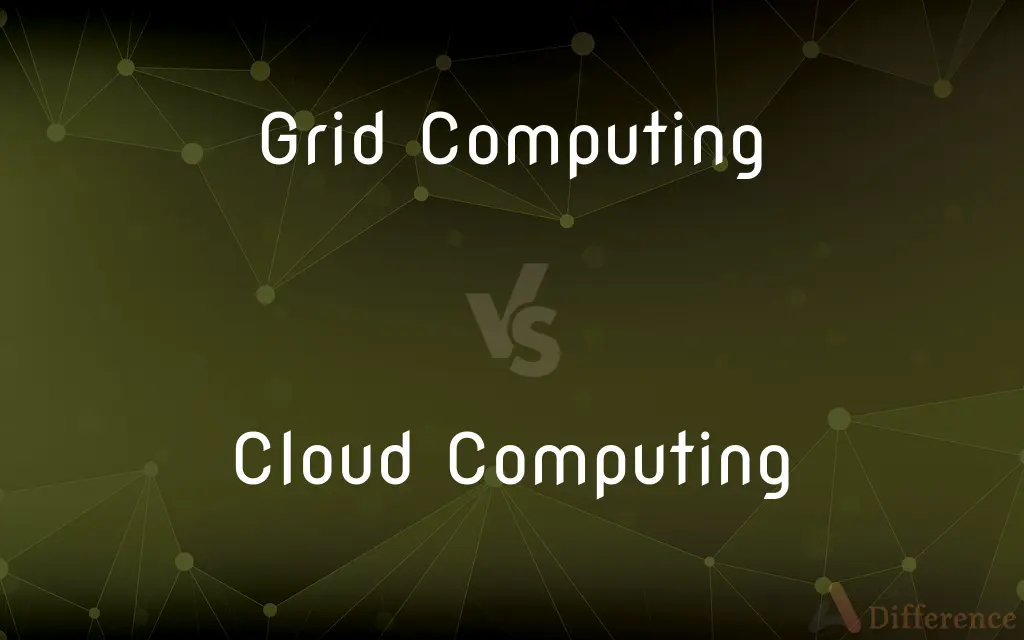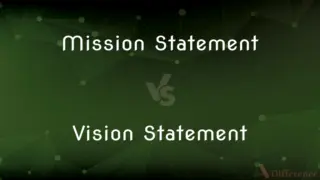Grid Computing vs. Cloud Computing — What's the Difference?
By Tayyaba Rehman — Published on November 17, 2023
Grid Computing combines computing resources for specific, intensive tasks. Cloud Computing provides scalable, on-demand resources and services over the internet.

Difference Between Grid Computing and Cloud Computing
Table of Contents
ADVERTISEMENT
Key Differences
Grid Computing and Cloud Computing are both technologies that allow for the utilization and sharing of computational resources. Grid Computing involves connecting distributed computing systems from different organizations to solve large-scale computational problems. Unlike Cloud Computing, which is meant for on-demand, scalable services and resources, Grid Computing focuses on the collective use of multiple resources to solve a particular problem or perform a computational task that’s too intensive for standalone systems.
In the realm of Grid Computing, the emphasis is heavily on the parallel processing of information. The network involved in Grid Computing is often dedicated to running a certain application or solving a specific set of problems, leveraging parallel processing by distributing tasks across multiple computers. Cloud Computing, on the other hand, does not require the dedicated use of network resources and allows for on-the-fly computation, storage, and service access, providing a versatile and flexible computational experience.
Focusing on the architectural elements, Grid Computing essentially meshes together various IT resources, which collectively act to work on data processing and task completion, often via a middleware that coordinates the processes. In contrast, Cloud Computing typically uses virtualization technologies to create scalable and dynamic IT infrastructure, providing resources as services that can be leased and scaled up or down depending on the user's requirements.
Diving into user access and interaction, Grid Computing often demands that users have some knowledge regarding the underlying technology and may require specific software to access grid resources. Cloud Computing is distinguished by its user-friendly nature, with users being able to access storage and computational resources via web interfaces, often without concern for the underlying technologies.
While exploring application in real-world scenarios, Grid Computing has frequently been employed in scientific, academic, and research contexts where vast computational capabilities are needed for specific projects or tasks. Cloud Computing, conversely, has found its place in numerous fields, offering services and resources for businesses, individual developers, and the general public, due to its scalability and flexibility.
ADVERTISEMENT
Comparison Chart
Primary Purpose
Problem-solving and intensive calculations
Providing on-demand resources and services
Resource Scalability
Limited
Highly scalable
User Accessibility
May require technical knowledge and specific software
Typically user-friendly and accessible via web interfaces
Cost Efficiency
Can be resource and cost-intensive
Pay-as-you-go models, often more cost-effective
Real-World Application
Common in scientific and research domains
Widely used in various industries for diverse applications
Compare with Definitions
Grid Computing
Grid Computing often uses middleware for coordinating and combining computational resources.
Middleware in Grid Computing ensures seamless data transfer between research facilities.
Cloud Computing
Cloud Computing provides scalable computing resources over the internet.
Cloud Computing allows businesses to scale their data storage without on-site hardware.
Grid Computing
Grid Computing enables the collaborative usage of diverse IT resources to attain higher computational power.
Scientists use Grid Computing to collaboratively simulate molecular structures.
Cloud Computing
Cloud Computing facilitates virtualization by abstracting the physical hardware.
Cloud Computing allows running multiple virtual machines on a single physical server.
Grid Computing
It utilizes various computers to work on a single task, emphasizing parallel processing.
In Grid Computing, different systems process genomic data simultaneously.
Cloud Computing
It provides on-demand access to computing services and IT resources.
Via Cloud Computing, developers access computational power as needed.
Grid Computing
Grid Computing combines computers from multiple administrative domains to solve problems together.
Grid Computing enables researchers globally to analyze climate data collectively.
Cloud Computing
Cloud Computing often operates on a pay-as-you-go cost structure.
Cloud Computing enables companies to only pay for the storage and services they use.
Grid Computing
It involves the solving of computational problems using multiple networked computers.
Grid Computing is deployed to decrypt complex coded messages by distributing tasks.
Cloud Computing
It allows users to access stored data and applications via the internet.
Cloud Computing enables remote access to software applications from any location.
Common Curiosities
What is the fundamental purpose of Grid Computing and Cloud Computing?
Grid Computing focuses on uniting computational resources to solve intensive tasks, while Cloud Computing provides scalable and on-demand computing resources and services via the internet.
How does user access differ between Grid Computing and Cloud Computing?
Grid Computing may require specific knowledge and software for access, while Cloud Computing typically offers user-friendly, web-based access to resources and services.
Can Grid Computing and Cloud Computing be integrated?
Yes, Grid Computing and Cloud Computing can sometimes be integrated, utilizing the robust computational capabilities of a grid with the scalable resources of the cloud.
Can both Grid Computing and Cloud Computing handle big data analytics?
Yes, Grid Computing can process large-scale data using distributed resources, while Cloud Computing provides scalable resources for big data storage and analytics.
Which is more cost-effective for small businesses: Grid Computing or Cloud Computing?
Cloud Computing is often more cost-effective for small businesses due to its pay-as-you-go model, whereas Grid Computing might demand substantial investment in resources.
Which of Grid Computing and Cloud Computing is typically easier to set up for organizations?
Cloud Computing is generally easier and quicker for organizations to set up due to its user-friendly interfaces and on-demand resources, compared to the potentially complex setup of Grid Computing.
Is Grid Computing or Cloud Computing more suitable for collaborative research?
Grid Computing is often favored for collaborative, computationally-intensive research, whereas Cloud Computing provides broader services for various collaborative endeavors.
How do Grid Computing and Cloud Computing deal with security and compliance?
Grid Computing may involve various security protocols across different domains, while Cloud Computing providers generally offer centralized security features and compliance certifications.
How does resource scalability compare between Grid Computing and Cloud Computing?
Grid Computing generally has limited scalability, while Cloud Computing is known for its high scalability and ability to adjust resources dynamically.
How do Grid Computing and Cloud Computing handle data storage differently?
Grid Computing tends to utilize decentralized data storage across connected computers, while Cloud Computing uses centralized data centers to provide web-accessible storage.
Which offers more flexible service options: Grid Computing or Cloud Computing?
Cloud Computing generally offers more flexible and varied service options (e.g., IaaS, PaaS, SaaS), while Grid Computing is often more specialized and task-specific.
Can I utilize Grid Computing and Cloud Computing for remote work?
While Grid Computing may not be inherently designed for remote work, Cloud Computing offers various services, like SaaS, to facilitate remote access and collaboration.
Which typically demands more technical know-how: Grid Computing or Cloud Computing?
Grid Computing usually demands more technical know-how for setup and management, while Cloud Computing is often more user-friendly and accessible.
Can both Grid Computing and Cloud Computing support Artificial Intelligence and Machine Learning applications?
Yes, Grid Computing can support AI/ML workloads with parallel processing, and Cloud Computing provides scalable resources and specialized services for AI/ML applications.
Are Grid Computing and Cloud Computing both suitable for high-performance computing (HPC)?
Grid Computing is traditionally associated with HPC due to its parallel processing capabilities, while Cloud Computing can also cater to HPC needs, given its scalable resources.
Share Your Discovery

Previous Comparison
Mission Statement vs. Vision Statement
Next Comparison
Continental Food vs. Italian FoodAuthor Spotlight
Written by
Tayyaba RehmanTayyaba Rehman is a distinguished writer, currently serving as a primary contributor to askdifference.com. As a researcher in semantics and etymology, Tayyaba's passion for the complexity of languages and their distinctions has found a perfect home on the platform. Tayyaba delves into the intricacies of language, distinguishing between commonly confused words and phrases, thereby providing clarity for readers worldwide.














































